When You Have a Great Life in France, Do You Have the Right to Complain?
After So Much French Summer Fun, Why Am I So Blue?
Roh-la-laaa les Ami-e-s (that’s like Oh-la-la but on steroids),
It is so wonderful to see you here again. Comment allez-vous ? (How are you?)
It means so much to me that you’re here. Merci for the support and for all the laughs and comments and poll responses. This community is a delight and I’m so happy to have found you all.
Moi, je suis épuisée (Me, I’m exhausted). En fait, j’ai le bourdon (literally, “In fact, I have the bumblebee,” but it means ‘the blues’). Do you ever feel a bit bumblebee’d between seasons?
I feel guilty for admitting it because I had more dang fun this summer in France than anyone should be entitled to. It’s not a complaint—simply the truth.
We had friends and family visiting throughout the season. We had brunch with our badass friend Dierdre’s son Alex (who happens to be legendary “Free Solo” climber Alex Honnold). And oh yeah, we took a massive road trip en Normandie et en Bretagne, including seafood platters galore and breakfast picnics in our tree house cabin in Pont Aven. I wrote about the first part of it here, and below are a few more snaps of our adventures.








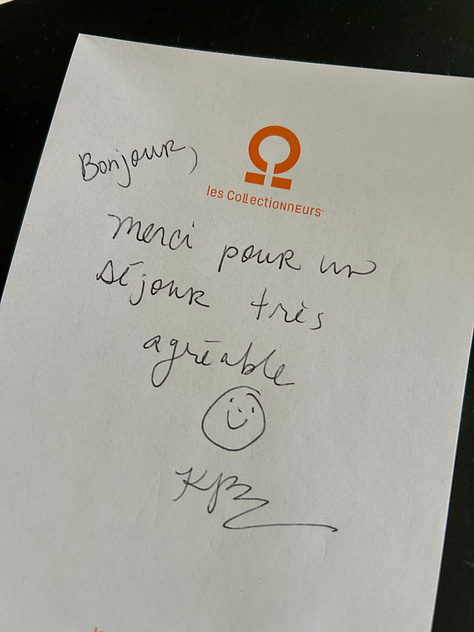
But in addition to all the marvelous times, I’ve also been worried and a bit down.
When la rentrée came around this year (that’s the period at the beginning of September when everyone’s back from les grandes vacances and school is starting again—it’s the return to the faster buzz of daily life), I really wasn’t feeling it.
Life in France: It’s Not All Sunshine and Croissants (but There Are a Lot of Croissants).
One of my most inspiring friends here in Paris is dealing with a serious health crisis. One of my nephews, an athletic and active 18-year old has been incredibly ill for weeks. And just yesterday my mother, live from Ohio, actually brought me to tears on the streets of Paris (over the telephone) with the kind of off-the-cuff brutal comment that is her specialty.
Then there’s my running, which I love so much and had to completely stop two months ago until the doctors could figure out qu’est-ce qui se passe (what’s going on) with my left leg. Wish me luck—I’m having a minor procedure soon to hopefully take care of it, so I can get on the roads and trails again and back to my cute French neighborhood running group. On croise les doigts (Fingers crossed).
What can I say? In spite of all the goodness and excitement and joy in this sweet French life (which I experience deeply and always), these past weeks I’ve just not felt my usual lightness of spirit. Is anyone else going through this? If you’ve got tips, please share.

IYKYK: Fun French Phrases to Say How You Feel
J’ai la pêche (I have the peach = I’m feeling great)
J’ai le cafard (I have the cockroach = I’m down)
J’ai le bourdon (I have the bumblebee = I’m down/blue)
Je pète le feu (I’m farting fire = I’m on fire/in shape/strong)
J’ai la frite (I have the french fry = I feel fab)
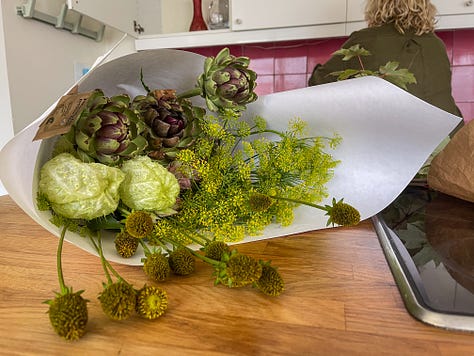


Two Things Came Along That Helped. A Lot.
They both involved my dear friend Sarah, who stopped over in Paris for a visit on her way through LA, Madrid, and Vienna, before heading home to la nouvelle Zélande.
We had so much fun exploring Paris and le Château de Fontainebleau with Monsieur B (he’s the reason I moved to France) as our inimitable guide, pointing out details we would likely never have noticed.
The first was that we decided to inject a dose of pure fun into life. We started with a bit of hair and makeup by the amazing beauty artist Jenya, then set up some sweet little photo shoots, the fruits of which I’ll be sharing in the weeks to come. Sarah is a professional magic maker with photos and videos and anything visual, and she’s got a lot to do with how this substack, La Flâneuse, looks and feels.
The second was that before she left, Sarah gave me a present. It was a book I’d been meaning to read (and put into practice) for years, The Artist’s Way by Julia Cameron. We’d seen it in Shakespeare & Co., the famous Parisan bookstore. I’ve now started working with it, and isn’t it funny how exactly what we need sometimes comes along at precisely the time we need it most?
Sarah also gave me a book on Renaissance femininity and beauty culture which is fascinating. Merci, ma chère Sarah.
Comments are simply the best! Leave one, won’t you?
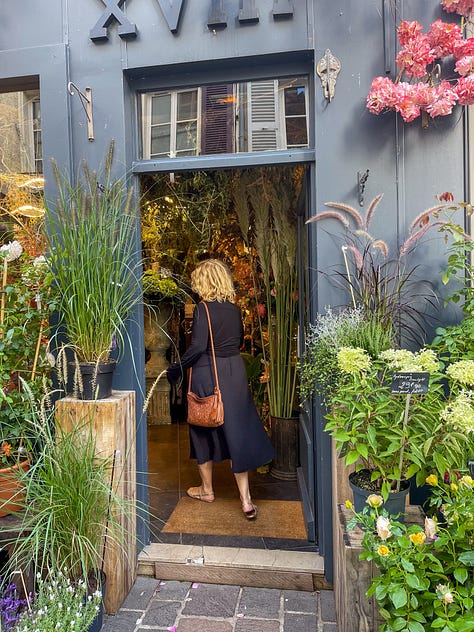

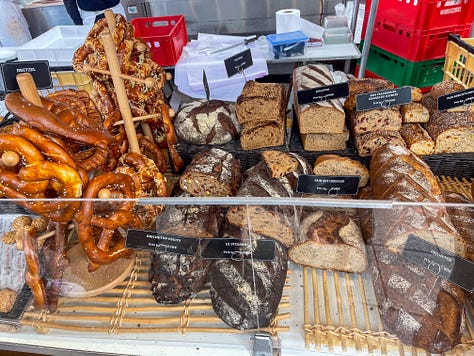


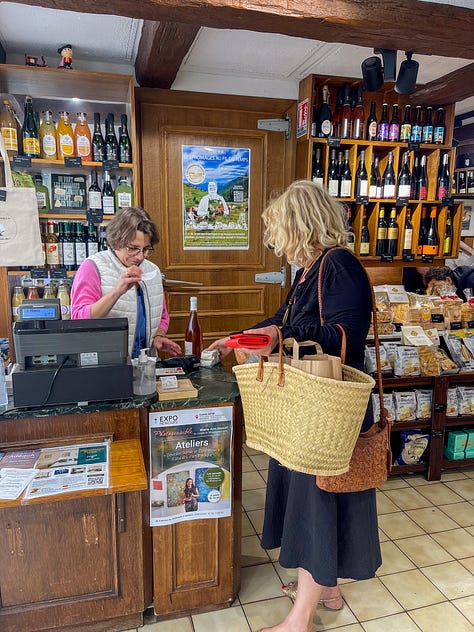
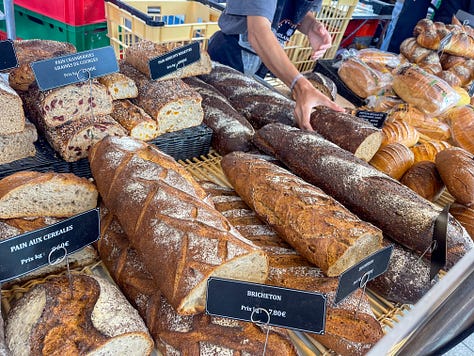

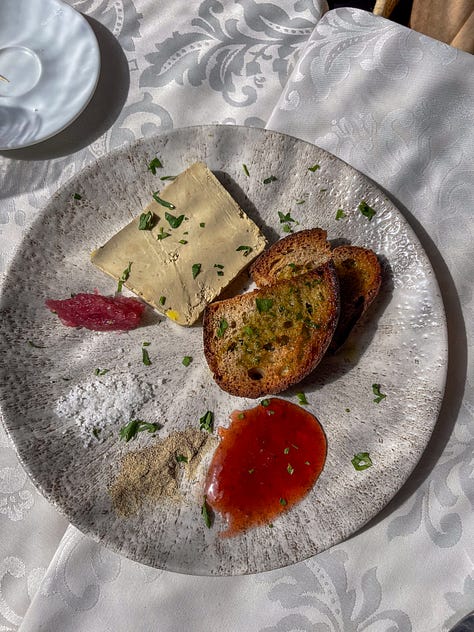
I’m grateful to say I seem to be escaping the bumblebees, if more slowly than my still recovering New-York-hustle brain would prefer.
Cooking Almost Always Helps.
If you’re looking for something to try, I’m loving this cheesy Baked Pasta with Sausage and Ricotta from the New York Times. And my Slow-simmered Leek and Chicken Soup is the perfect comfort food for times of transition. Tellement cosy ! (So cozy!)
If by chance a recipe won’t work, try this prescription: A ridiculously silly animal antics compilation from YouTube. It’s the goats for me and those (?) alpacas jumping over the mud.
If you too have those damn heavy bumbling bees, I wish you rest and patience and a gentle entry into this new season, wherever you may be (or bee). I also wish you a trip to Paris if you want one.
In the meantime, we’ve got lots to celebrate: new ideas, fresh challenges, more stories to tell. Let’s stick together and share our love of living fully and joyfully. Let’s honor the complex and mysterious creatures we truly are.






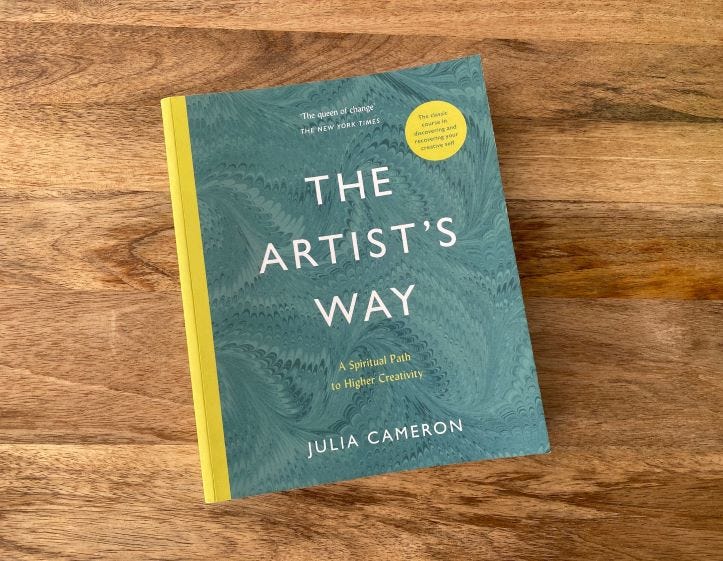
I am sorry to hear that your spirits are low. My favorite silly french expression is Avoir le cafard. Maybe its my roots in Manhattan and thus aversion to cockroaches. But yes, having the cockroach is a low feeling! Everyone needs a Sarah in our lives. For deeper lows, I do find restarting my morning pages practice (Julia Cameron) to be very therapeutic. For mild ones, sleep and nature can be excellent healers. I almost never read agitating books, by which I mean high suspense, high tension, high weird, high anxiety. By contrast, I find certain types of books expecially delightful, namely, narrative non-fiction books about people or experiences that I am especially interested in. Currently I am reading The Slip by Prudence Peiffer about a group of artists between 1956-1967 on Coenties Slip in Manhattan. I'm fascinating with 20th century art history and, of course, NYC. So this is a wonderful escape from my anxiety over the upcoming election, or the global violence playing out, or the black cloud of AI or the climate crisis over my head. Some people find escape in Tolkien, others the fairy realm, some in snarky love stories. Me? I want Walt Whitman and non-fiction. What's your best escape read? Be sure you have one within arms reach.
We give our mother's an inordinate amount of power to hurt us. Try to remember she is a human, flawed like the rest of us. My advice: limit your exposure to her. This might mean not seeking her comfort, not sharing your life so openly with her, or simply calling half as frequently. Don't waste your time trying to understand her hostility. Often it has little to nothing to do with you. Just don't stick your fingers in the lion cage.
Your pictures are a delight and take me back to my own experiences in France. I am not a raw oyster person, despite having grown up in coastal New England. However, oyster stew (which certainly isn't a stew) was a long family tradition. My maternal uncle used to make it every Thanksgiving. So while living in Provence in Nov 2008, I hosted a Thanksgiving dinner for 13 French friends who knew little about the whole ritual except that it was a big American holiday where we ate Turkey. There are dozens of very funny stories I could share with you from that dinner adventure but the one I will share here is about the oyster stew.
My recipe required cups of shucked oysters but in France you must buy grams of oysters in their bulky shells. Thus I converted the cups I needed to grams, bought 4 oysters and weighed them shelled and shucked to determine the ratio, and then multiplied that ratio against my shucked oyster needs to arrived at my shelled oyster needs. This I took to the poisonerie at the market. However, in France, you buy oysters by "brand." I think to some degree this is true here now too. But in 2008 that wasn't the case in the US--and oyster was an oyster. The Poissonerier asked me did I want the ABC oyster that lived off of Biarritz where it was washed by a warmer water current or the XYZ oyster from 30 kms off Nantes where the water moved rapidly and cold. There were the PQR oysters raised at the base of the Calanques, all salty and full of calcium. Or imported oysters from Alaska or Louisiana. All of this in the twangy French of a Provencal fish monger. Overwhelmed I stammered my selection but alas! She had no where near enough oysters in any of the varieties I selected. So I bought what I could from her and headed to the poissonerie in Avignon and also the fish counter at my local Intermarche. With my icebox full of oysters, carefully wrapped in wax paper and string, I returned to our 16th century house and dug in its kitchen tool basket for an oyster knife. My maternal family owned a fish market and my mother could open oysters like a pro. She never bothered to teach me those skills but I knew the sounds and the action and to recognize the stout looking knife. Fortunately the couple who owned our house were also friends and Joel came over with with two oyster knives in hand on the eve of Thanksgiving. He taught high school French and spoke a few colloquial phrases in English just to show his teenage students he was hip. We shucked oysters into a collective bowl regardless of the rock on which they grew. About every third oyster Joel shucked he swallowed before it landed in the bowl as I mentally subtracted it from the grams needed. When I explained to him in my rough french that I intended to cook the naked oysters in butter, Joel sucked in his breath dubiously and shook his head disapprovingly. "non, non," he said. I explained it was a traditional New England dish and promised he would love it which he responded by swallowing another raw oyster as an act of defiance. Essentially oyster stew is a saute of minced shallots and butter, then oysters, then loads of cream and more butter. When you sip the soup its hot cream, thinner than a chowder, with a buttery glisten to its surface, and occasionally you have a soft nugget of oyster, slightly briny and salty. Its all the things the french most love. As I carefully followed my uncle's recipe, I felt fairly certain this recipe would please my French guests. But by the time they each took their ladder back chair around the long farm table in our dining room gossip had spread that the aroma indicated I had COOKED the oysters. They compared recipes they had had and hated where oysters had been cooked. They remembered rare varieties of oysters they had swallowed raw decades earlier. They asked loaded questions as to WHY I would want to cook or mix my beautiful oysters. The only way to answer was to fill their bowls. They looked down through the steam into the shiny white soup and raised their round spoons. It was like a child trying spinach for the first time. They slurped, tasted, tried again. I saw a thumbs up. Then, heard an "ooh la la." Then silence except for the contented slurps, clink of spoons against porcelain, and the occasional napkin making a swipe.
Good luck with your leg and the running.
Oh dear girl, I'm sorry you are having a down time. And I felt the pain of the 'brutal comment'...it's a familiar pattern in our extended family and having grown up surrounded by that, I know how bruising that can be. I'd say honor your exhaustion with rest. Don't feel guilty about feeling however you feel and immerse yourself in gentleness to yourself. It will pass and you will have abundant wonderful things to give to those around you...but you do need to care for yourself in order to be able to do that. If you're sad, be sad til you don't need to be sad anymore. Love, Aunt Missy